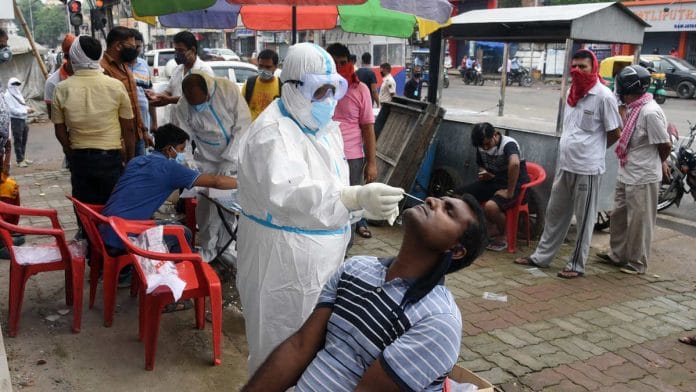New Delhi: In a joint statement, the Indian Public Health Association (IPHA) and two other groups have recommended that at the “current community transmission phase”, the focus of the Narendra Modi government’s Covid-19 containment response should shift from scaling up testing to preventing deaths.
“Universal scaling up of testing at current community transmission stage of the pandemic may not be an optimal control strategy and will divert attention and resources from control measures,” said the statement.
“Experience from other countries … indicates that increased testing does not prevent the deaths from COVID-19,” which “should be the primary goal,” it said.
Released on 25 August, the statement was written by a joint task force of public health experts from the IPHA, Indian Association of Preventive and Social Medicine (IAPSM) and the Indian Association of Epidemiologists (IAE). The task force was constituted in April to advise the Modi government on Covid containment.
In addition to promoting “differential/targeted testing of high-risk individuals and discontinuing universal testing at this stage”, the statement also recommended a return to normalcy, with gradual opening up of schools and other health services, as well as higher healthcare expenditure.
As of Tuesday, India has 7,85,996 active Covid cases. The total cases stand at nearly 37 lakh, along with 65,288 deaths.
Also read: Scientists observe higher Covid-19 viral load in asymptomatic individuals in India
Time to reevaluate ‘test, track, treat’ strategy
The joint statement of by the public health groups stressed that “testing by itself is not a control strategy”, adding that “test, track, treat, isolate” is useful when the pandemic is at its early stages.
“Since the virus has already widely spread in the community in many geographical areas, current strategy would not serve the intended objectives,” said the statement.
It recommended that in high-caseload areas, “all symptomatic cases should be treated on the lines of confirmed cases to isolate and treat to reduce the spread and mortality even without testing as the probability of being positive is quite high”.
In smaller towns where caseload is low, testing “may be used as a surveillance tool” and containment zones should continue.
The disease is “increasingly spreading to small towns and rural areas,” and still heavily stigmatised. The practice of pasting notices or barricading the houses of those who are Covid-19 positive should be “abandoned immediately”, it said.
It also suggested that the government’s Covid prevention strategy “must assume that an effective vaccine would not be available in near future,” but whenever it becomes available, it “may play a role in providing personal protection to high-risk individuals like HCWs (healthcare workers) and elderly with co-morbidities”.
The groups also said there is no evidence to suggest that weekend lockdowns, banning of domestic flights, or large containment zones “serve any useful purpose”.
Also read: Cancers spread, heart conditions worsen — halt on elective surgeries taking its toll
Return to normalcy
The statement said it is time now to move towards normalcy. “Opening of school and other educational institutions could be started in graded manner.”
In areas with low caseload, schools may open after taking precautionary measures such as social distancing and alternate working days.
“Sufficient evidence is available that infected, young children are at an extremely low risk of developing morbidity. The risk of young children transmitting corona infection to older family members would be the same as adult family members who are permitted to carry out activities outside of home environment,” it said.
The closure of schools has disproportionately affected children of lower socio-economic strata who do not have social capital for alternatives like digital platforms, it pointed out.
Raising healthcare expenditure
The joint statement also recommended that public healthcare infrastructure be increased to 5 per cent of the GDP.
The focus of higher expenditure “should be on primary health care and human resource and infrastructure strengthening rather than opening/strengthening tertiary care centres”, it said.
“There is a need to expedite the establishment of a dedicated, efficient, and adequately resourced public health cadre as Indian Health Service (IHS) in the center and across states,” it added.
Also read: Speaking certain languages could lead to wider spread of Covid, Russian study says







Public health bodies after all the failure want put the burden on country’s tertiary care which is already under stress.
Continue graded lock down till a vaccine or effective treatment comes up. Online schools can serve the purpose for now. Govt. should support poor students for online education. Liquor politics should stop.
Public health bodies after all the failure want put the burden on country’s tertiary care which is already under stress.
Continue graded lock down till a vaccine or effective treatment comes up. Online schools can serve the purpose for now. Govt. should support poor students for online education. Liquor politics should stop.
You cannot have a uniform pan India strategy. While the re look might be relevant for high case load areas, the strategy of 3 T – track, test, treat is still relevant to large parts of India and should be strictly adhered to. Pick up the districts with high sero prevalence and deaths to then change the strategy to focus more on reducing the deaths